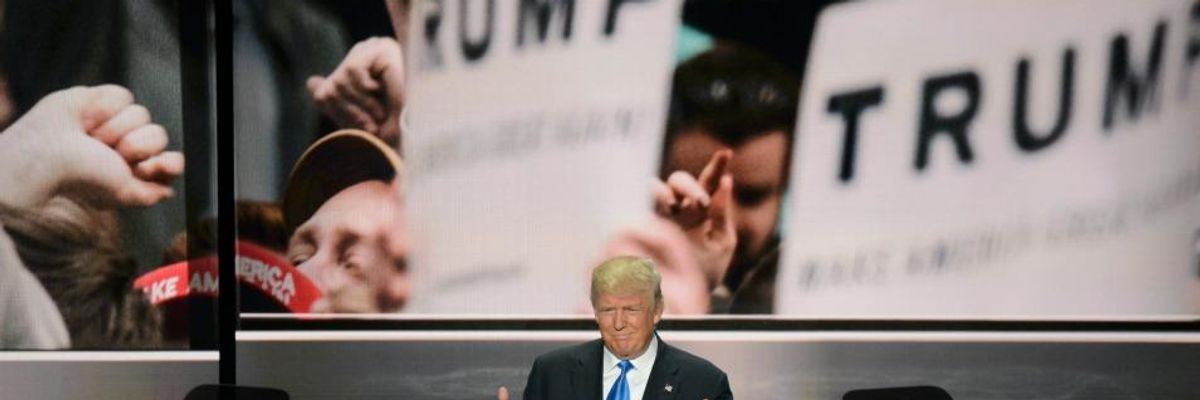The grubby underside of US electoral politics is on show once again as the Democratic and Republican candidates prepare to fight it out for the presidency. And it doesn't get seamier than the battle to prove how loyal each candidate is to Israel.
New depths are likely to be plumbed this week at the Republican convention in Cleveland, as Donald Trump is crowned the party's nominee. His platform breaks with decades of United States policy to effectively deny the Palestinians any hope of statehood.
The question now is whether the Democratic candidate, Hillary Clinton, who positions herself as Israel's greatest ally, will try to outbid Trump in cravenly submitting to the Israeli right.
It all started so differently. Through much of the primary season, Benjamin Netanyahu's government had reason to be worried about Israel's "special relationship" with the next occupant of the White House.
Early on, Trump promised to be "neutral" and expressed doubts about whether it made sense to hand Israel billions of dollars annually in military aid. He backed a two-state solution and refused to recognise Jerusalem as Israel's capital.
On the Democrat side, Clinton was challenged by outsider Bernie Sanders, who urged "even-handedness" towards Israel and the Palestinians. He too objected to the huge sums of aid the US bestows on Israel.
Sanders exploited his massive support among Democrats to force Clinton to include well-known supporters of Palestinian rights on the committee that drafts the party's platform.
But any hopes of an imminent change in US policy in the Middle East have been dashed.
Last week, as the draft Republic platform was leaked, Trump proudly tweeted that it was the "most pro-Israel of all time!" Avoiding any mention of a two-state solution, it states: "Support for Israel is an expression of Americanism. ... We reject the false notion that Israel is an occupier."
The capitulation was so complete that even the Anti-Defamation League, a New York-based apologist group for Israel, called the platform "disappointing" and urged the Republican convention to "reconsider". After all, even Netanyahu pays lip service to the need for a Palestinian state.
But Trump is not signalling caution. His new advisers on Israel, David Friedman and Jason Greenblatt, are fervent supporters of the settlements and annexation of Palestinian territory.
Trump's running mate, announced at the weekend, is Indiana governor Mike Pence, an evangelical Christian and a stalwart of pro-Israel causes.
So why the dramatic turnaround?
Candidates for high office in the US need money - lots of it. Until now Trump has been chiefly relying on his own wealth. He has raised less than $70 million, a fifth of Clinton's war-chest.
The Republican party's most significant donor is Sheldon Adelson, a casino magnate and close friend of Netanyahu. He has hinted that he will contribute more than $100 million to the Trump campaign if he likes what he sees.
Should Netanyahu offer implicit endorsement, as he did for Mitt Romney in the 2012 race, Christian Zionist preachers such as John Hagee will rally ten of millions of followers to Trump's side too - and fill his coffers.
Similar indications that money is influencing policy are evident in the Democratic party.
Sanders funded his campaign through small donations, giving him the freedom to follow his conscience. Clinton, by contrast, has relied on mega-donors, including some, such as Haim Saban, who regard Israel as a key election issue.
That may explain why, despite the many concessions made to Sanders on the Democratic platform, Clinton's team refused to budge on Israel issues. As a result, the draft platform fails to call for an end to the occupation or even mention the settlements.
According to The New York Times, Clinton's advisers are vetting James Stavridis as a potential running mate. A former Nato commander, he is close to the Israeli defence establishment and known for his hawkish pro-Israel positions.
Clinton, meanwhile, has promised to use all her might to fight the growing boycott movement, which seeks to isolate Israel over its decades-long occupation of Palestinian territory.
The two candidates' fierce commitment to Israel appears to fly in the face of wider public sentiment, especially among Democrats.
A recent Pew poll found 57 per cent of young, more liberal Democrats sympathised with the Palestinians rather than Israel. Support for hawkish Israeli positions is weakening among American Jews too, a key Democratic constituency. About 61 per cent believe Israel can live peacefully next to an independent Palestinian state.
The toxic influence of money in the US presidential elections can be felt in many areas of policy, both domestic and foreign.
But the divorce between the candidates' fervour on Israel and the growing doubts of many of their supporters is particularly stark.
It should be dawning on US politicians that a real debate about the nation's relationship with Israel cannot be deferred much longer.

